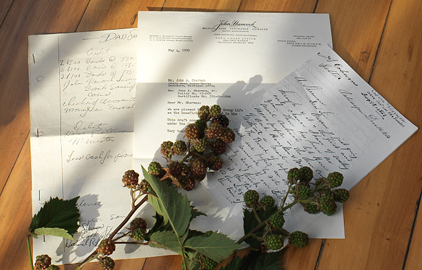Wills, trusts, and legacies are important legal directives that address the important task of providing financially and materially for loved ones. However, they can feel impersonal, as they don't really address emotional needs or speak from the heart. For those interested in crafting a more personal goodbye: consider an ethical will. Also called a heart will, an ethical will can be a private, recorded set of your final words, something more personal to leave your friends and family.
What is an ethical or heart will? How do you draft a heart will? Will the right people, and the right people only, have access to your heart will? This section of SevenPonds will help to answer your questions about this important element of end of life planning.
Things to Know:
- Traditional wills leave valuables; a heart will leaves values and or love.
- While commonly used by the terminally ill, healthy people can create and annually update a heart will.
- If your heart will is recorded on DVD or another media format, it’s a good idea to create a written backup.
- Heart wills are NOT legal documents. You can release them at any time, not necessarily only after death.
What is an ethical will or heart will?
While a traditional, legally binding will bequeaths material goods, a heart will deals predominantly with the nonmaterial. "Heart will" is the most common term used today, but these wills are also known as ethical wills, love wills, spiritual wills, legacy letters, life letters, and ending notes. Heart wills can be drafted in almost any format, such as a written letter, an audio record, or a video. With a heart will, you can share old memories, personal stories, words of wisdom, hopes, dreams, and feelings. Heart wills can bestow material goods as well, such as a favorite piece of jewelry to be gifted to a grandchild on a particular birthday.
Remember that a heart will is not legally binding like a traditional will is. Make sure items in your heart will do not contradict your legal will. Think of a heart will as leaving your thoughts, words, and love behind for family and friends, in a way that a legal will cannot.
Who should leave a heart will?
Anyone can leave a heart will at any time. While they are most commonly used by terminally ill patients who know their death is imminent, healthy people can draft heart wills as well. Heart wills can be updated annually and can be released whenever seen fit, not necessarily only following death.
What should I include in my heart will?
Again, there are no rules. Here are some examples of just a few things you might want to communicate:
- Values, beliefs, life lessons, and hopes.
- Expressions of appreciation for those who have helped you or made you happy in a significant way.
- “Guiding hand” advice from a parent to his or her children; your hopes for your children’s future.
- Regrets, apologies, or requests for forgiveness.
- Spiritual beliefs, such as philosophies on life or thoughts on what happens to us after death.
- Your life story, to help your loved ones understand your experiences.
- Your family history, to help your relatives understand their heritage.
- Reiterations of your advance health care directives, including your wishes for treatment when dying and your wishes for disposition after death.
- Your hopes and wishes for your loved ones after your death.
How do I create a heart will?
Heart wills are highly personal, even spiritual, documents, and you can create them in whatever format you feel most comfortable expressing yourself. That being said, we have some suggestions you may consider before getting started.
Whether you intend to write or record your heart will, it’s a good idea to start with an outline of what you want to say. Here’s a suggested process:
- Determine the audience(s) for your heart will, such as your spouse/partner, adult children, young children, or friends.
- Decide if one heart will is enough or if you want to create separate heart wills for specific people or groups of people.
- Think about what you want to share by first jotting down an informal list. Make an outline, if it helps you.
- If you are making a recording, try to speak, rather than recite. You probably don’t want to sound or look like you are reading from a script. For this format, outlines might be more useful than full text. You can make a video recording of your heart will on your own, with the help of a friend or relative, at home, or at a production studio. You can use your own or rented equipment. Think about making copies and leaving a written-out transcript to back up your heart will.
- If you plan to leave your heart will in the form of a letter, you will need to turn your outline into your story. Allow yourself time; make as many drafts as you need until you feel satisfied.
- If you create your heart will long before your death, remember to periodically update it to keep it relevant.







